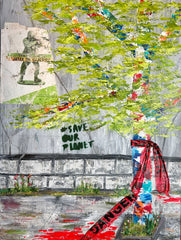With this week marking the second anniversary of the war in Ukraine and people in Rafah living a disastrous nightmare as they fear an attack with nowhere to go, I thought I would talk about some of the thoughts behind my painting No Good Wars!

Early last year, I painted a huge tree in an urban setting and called it Urban Queen. The idea came up while I was walking in my neighbourhood, when the mind wanders and absorbs in a disorderly fashion the sights, sounds and smells. The result was really interesting to me, both from a creative and intellectual perspective. I got to create my first graffiti, which took a few tries and some tips from a Gen Z. This work led me to reflect on the juxtaposition of the beauty of nature with the greyness and at times ugliness of the city or life in general.
No Good Wars! came about roughly in the same way. With all the violence happening in the world, in Ukraine, in Gaza, in other parts of the world such as Africa where conflicts do make the nightly news, and even closer to us, in our streets and our homes, it seems that the world has lost yet again any form of moral compass and is being driven by the overinflated egos of baby boom leaders desperately holding on to power, or wanting power at all costs. The lack of strong and morally-sound based leadership in our societies is astounding and seems to permeate all spheres of society. As citizens, our outcries seem unheard for the most part and our apathy is nourished notably by an overload of stimuli and information (real and not) that we have become addicted to.
The wars in Ukraine and Israel are certainly the most documented wars in terms of images and recorded lived experiences. We have access to suffering on a minute-by-minute basis and yet it seems that it does not have a long-lasting impact on our actions. We complain that we cannot watch the news because it affects our mental health as if what we were seeing was not happening to real people.
I am no different and no better than anyone else. Having had the opportunity to take a step back from the craziness of my life in recent months, the space I strive to create away from the noise has been hard to achieve and is not leak-proof. How easy it is to go down meaningless rabbit holes on social media to numb ourselves when life is too much to bear. I think that modern societies have reached a point of inflexion and that we are at great risk of leaving a desolate state to those who will come after us.
The tasks to course correct seem unfathomable and unachievable given where we are in the race. But, it has been my experience both at work and life that the best way to tackle a daunting goal is by knowing where you want to end up, to identify key steps to get there and break it down further into tangible little actions and worry as much about what you are doing as how you are doing it. So simple, yet extremely hard to achieve; however, it does not mean that it should not be tried.
In our situation, imagine if we consider as a key step on our journey to a better society the mindset based on the fact that all human life has the same value. Regardless of where you live or what you do, the importance that you bestow on those you love should be the same for all those outside your circle. Would that change how you see people in the streets begging for food or unconscious, suffering from addiction? Would world humanitarian responses continue to vary depending on where natural disasters occur? This would mean going back to a notion of collectivity, that is, that which matters most is above self-interest, and to achieve this, the first little step is to realise what our mindset is, acknowledge it and open it up to change. What would change if these three little actions were put into motion?
In my view, there are no good wars, and you can define wars as being a range from what we see in Ukraine to the current culture wars between the left and the right to the ongoing attacks on the fundamental rights of women and 2SLGBTQI+ minorities. Healthy conflict is needed to innovate, generate ideas, bring about solutions and advance as a society. This being said, they may not lead to resolution but they may lead to a greater respect among parties and a sense of being heard. And to do that, we need to have the right mindset.
As for my comment about leadership, I will come back to that notion in a future blog - this is one of the areas where through my own experience as a leader and as being led, I have seen the good, the bad and the ugly. While it might look bleak at the moment, all is not lost. I remain an optimist, particularly as I look at the future generations coming up the ranks.
Lastly, some recommendations of things to watch and listen to if you have the interest and the time.
In time for March 8th, the International Day dedicated to Women, the film Women Talking by Canadian Sarah Polley. Available on Netflix
The Science of Quitting: How, When and Why do It from the podcast 10 Percent Happier. available notably on Spotify.
Et pour les francophiles et les francophones, j’ai découvert récemment les podcasts de Dominic Tardif, Juste entre toi et moi et Deviens-tu c’que t’as voulu? Sur Spotify notamment. De belles rencontres et du pur bonbon.
